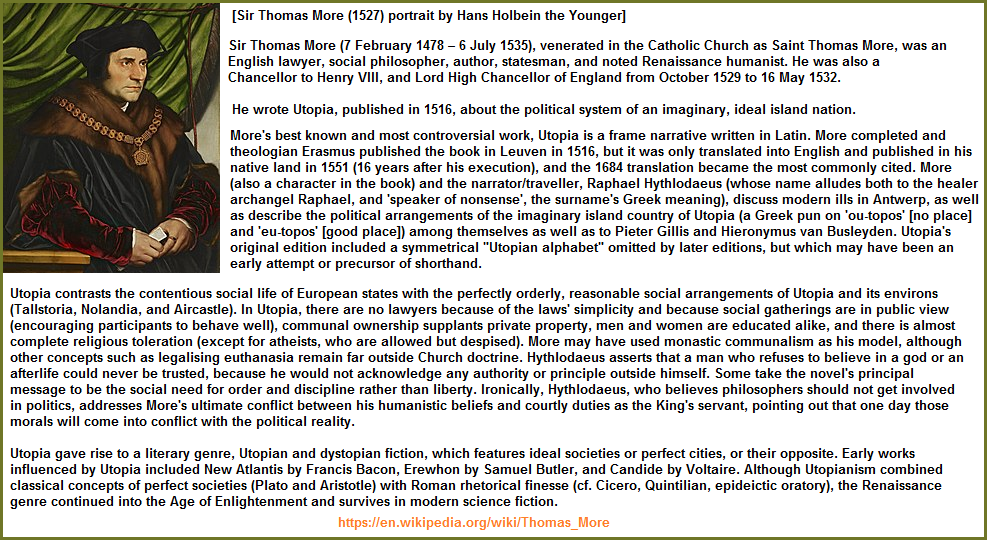Revelation page 3
~ The Study of Threes ~
http://threesology.org

Visitors as of 1st Feb 2020
| Preface page 1 | Preface page 2 | Preface page 3 |
| Preface page 1b | Preface page 2b | Preface page 3b |
| ANC Prologue Page 1 |
ANC Prologue Page 2 |
ANC Prologue Page 3 |
| ANC Prologue Page 1b |
ANC Prologue Page 2b |
ANC Prologue Page 3b |
| Communism and Societal Collapse |
| ANC Epilogue Page 1 |
ANC Epilogue Page 2 |
ANC Epilogue Page 3 |
There are those who advocate going beyond what may be called a Communism that later became formulated as a Social Democracy which now has the monikered currency of "Democratic Socialism," that is being militantly advocated by Leo Panitch in his idea of a "Radical Democratic Socialism": The Long Shot of Democratic Socialism Is Our Only Shot. I say "militantly" because of the (metaphorical) implications which any "radical" approach suggests, not only in politics but all genres of interest, where any model of assertiveness is required. One need not take up the armaments of war to advance ideas that are fought with pens, pencils, pamphlets, books, articles, speeches, rallies, and other "soft" campaigns of militant-like "theaters" of operation where underlying intellectualized vociferous accounts of wanting to overthrow the government frequently prevails, though not always openly voiced.
It has been stated and similarly worded by others that "ideological nets are often too constrained and would be better served by being cast as wide as possible, so as to avoid becoming irrelevant." This is what Leo Panitch is attempting to convey... despite the short-comings of Socialism due to its perception being received in such a way as to be interpreted by many as representing a path to sorrow, destruction and death. Indeed...:
- Communism has sometimes been stereotyped as a hard-nosed militant using a rifle as a pole from which is suspended a piece of bread with the word "Utopia" burned into it's crust as it leads its public along roads lined with gulags and concentration camps.
- Socialism has been stereotyped as a Bohemian vagrant that arrogantly insists upon being treated as a member of a royal family deserving a place at a linen-embroidered table of dependency that others are legally bound to prepare and serve the necessities but clean up the discarded detritus and occasional vomit, urine and feces from an over-abundant indulgence.
- Likewise, any variant of Communism and Socialism attempting to cast a different shadow and provide a more melodious echo by inculcating the word "Democracy" into its bosom in one fashion or another, is frequently interpreted to be a bait-and-switch ploy.
Needless to say, both Communism and Socialism have had lousy public relations being applied to their efforts of portraying what their adherents believe to be more equitable forms of socialization for humanity the whole. Unfortunately, their present philosophies are tainted with an expressed hubris of adolescent impudence, impatience and impulsivity. In short, the philosophies of both need to grow up and move past their adolescent gesturing, demands, and fairytale proposals. They are so stinkingly insistent about perpetuating Marxist ideology that may or may not contain Marxist influenced Leninism, Maoism, Troskyim, Stalinism and various other more isolated gesturings. The situation has gotten worse by more people becoming aware of how phony Democracy actually is and being practiced with its many flavors of different political ideologies, including Communism and Socialism. All of them are less than perfect but Democracy has the present advantage only because it is situated on top of the hill backed up by commercialized, religionized and militarized activities. Its players are controlling the resources, which is the people themselves. And the people have trouble trusting Communism and Socialism because they are being expressed by adolescent ideologies carried over from previous eras which professed the same level and type of idiocy.
The old and present day packaging of Communism and Socialism are not being bought by the average consumer, and the diehard consumers continue to "buy into" the Marxist and copycat flavors because of an habituation they don't know how to free their minds from because of some personally-styled addiction there to. It is a marketing problem which is confronted by an organizational philosophy and methodology which eschews the usage of any marketing formula because of an anti-Capitalism rhetoric; even though it is not Capitalism which is the evil enemy but those using Capitalism for selfish interests.
Let's take a look at some clothes featuring the words Socialism and Communism in terms of what can be described as the Old and New variations, noting that if we were to display the words on the backs of the hoodies, the interpretation of readers might be altered since they are most likely to be viewed as gang emblems though smaller letters on the front might receive an inquisitive response instead of a heightened objectional one. In addition, the directions of the words on the pant legs are reversed to invest the reader's consideration of whether they think the wording is accepted more readily if it is written upwards or downwards.
 |
 |
 |
 |
 |
 |
 |
 |
As is commonly seen in the history of humanity, the offering of one view frequently leads to the offerings of its opposite. Hence, while Marx's (and others) view of the desired, eventually fully implemented Communism is said to bring about a Utopia, the idea of a Dystopia has been promoted in different eras with the following Wikipedia excerpt as a generalized representative definition:
A Dystopia (from Ancient Greek "bad" and "place"; alternatively, cacotopia, kakotopia, or simply anti-utopia) is a community or society that is undesirable or frightening. It is translated as "bad place" and is an antonym of utopia, a term that was coined by Sir Thomas More and figures as the title of his best known work, published 1516, a blueprint for an ideal society with minimal crime, violence and poverty.
However, while we may give credit to Thomas More for the word "Utopia", we can go backwards in time and find an alternative source for the idea such as In the last of Plato’s dialogues called the laws. In it, he sketches the basic political structure and laws of an ideal city named Magnesia. The Laws, according to this reference: Plato on Utopia, are divided into three groups:
- Group 3: Critias, Laws, Philebus, Sophist, Statesman, and Timaeus
- Group 2: Parmenides, Phaedrus, Republic, and Theaetetus
- Group 1: the rest
As it stands, Communism is perceived as Democracy's "Dystopia," with "Socialism" seen either as a variant thereof or a milder "middle man" playing the part of a yes man to whomever is in charge, be it Democracy or Communism. In any respect, neither Socialism or Communism are trusted. They are being perceived as the bad guys, as the bully-in-waiting, or mugger in the shadows, and will effect an intolerable condition if given a license to carry out its impulses. Both Communist and Socialist commentators refuse to let Marx and his followers die. They do not own Communism. Communism nor Socialism belongs to any of the present or former Communist and Socialist adherents who advocate the old ideological constraints. If you want to take Socialism and/or Communism into a brighter future they must have a brighter past involving a new ideological perspective and program born of today. Marx and the others must stop being used as revered icons or deities. Indeed, we don't even need to use either the word "Communism" or "Socialism" as if they were some sort of name-brand product that suggests the wearer is somehow to be identified with a certain notable greatness or enviness.
Please notice there is no specific "topia" ending word being used to identify some central position, although present forms of government could be assigned with the suffix such as Democracy-topia, Socialism-topia, etc... If we view the Utopia and Dysutopia as Major and Minor premises, the conclusion is left up to whomever places whichever of these two as the major premise and minor premise. In other words if a Utopian says "Utopia" is the Major premise than the conclusion will most likely be illustrated by their inclined perspectives. Likewise for those who would assign the word "Dys-Utopia" as the Major premise.
If we were to apply a three-part referencing model to the ideas of Utopia, Dys-utopia and some middle ground to the three-part sociological model described as Upper, Middle and Lower classes, we might, depending on our vantage point preference, juggle the three around to describe the differences of opinion the three classes might well entertain. For example, the Upper class may perceive itself as a type of Utopia, the Middle class as some sort of "lost in the middle" topia variation, and the Lower class as an unfavorable Dys-utopia. If on the other hand we were to ask someone from the Lower class to rate their own life-style in a positive manner, they might well describe themselves as living a type of Utopia, the Middle class as a Dys-utopia and the Upper class as a "Lost in space" characterization, depending of course on the mood of the person that is being asked and whether they are inclined to look at one's overall life in a philosophically attuned "making the best of a bad situation" characterization.
Again, for example:
- A Person from the Upper social class may claim they are living in as close to the idea of a Utopia that is possible today (thus reflecting the idea "all is for the best in this best of all possible worlds" found in Voltaire's Candide and was used by Stephen Jay Gould to advanced a biological concept involving spandrels, of which will be momentarily referenced further on).
- A Person from the Upper social class may claim that a person living in the Middle Social Class is living in a state of Limbo— between a Utopia and Dys-utopia, but it is better than those living in the Lower class.
- A person from the Upper social class may claim that those living in the Lower class experience a Dys-utopia in some many ways and dimensions, but they are nonetheless necessary (to keep them that way) in order that the present state of Utopia is made possible and that at least all three classes are better off (from their perspective) than they would be if there were no distinctions and the general rule-of-thumb was to have an even distribution of resources; whereby the majority of those getting an assumed "fair share" would simply hoard it and not combine it with others to create an enlarged repository for all to benefit by, and that those presently in the Upper class (out of the good of their hearts they might claim), engage in practices which bring about jobs so that everyone... or the majority (as they define it), have some semblance of a good life.
The point is, I view both polarities as a polarity, including any conclusion they might want to develop. In other words, all ideas which claim that they seek to build (on Earth... sometime in the future) a Utopia if such and such a game plan (such as present formulas of Communism and Socialism) are pursued; are actually representing Dys-utopias because they are attempting to be built on a piece of land which is unstable. There is no "ultimate" Heaven-on-Earth form of Utopia, with or without politics, without Capitalism (Communism?), business, science, religion, etc., to be achieved and thus defined as a harmony of all disparate elements, when those advocating such a song to be sung in unison is being offered while the amphitheater is falling apart around them and disturbing any desired resonance and equalized vibration can be changed into a melodic hum... like some celebrated chant in an effort to reach some supposed exalted position of ultra-consciousness.
The search for, the striving for, the desire for a harmonization of all disparate human elements is the idea embraced by adolescent minds who are not taking into consideration the effects of an incrementally deteriorating environment and how those searchers, those strivings, those desires. However, the idea of harmony, of an harmonization, sometimes interpreted to mean an Homogenization, as if some supposed greater equality is to be achieved by some imagined perfect blending... although such a supposed "perfect blending" is assumed to be possible and that once achieved, some superior quality will emerge (like the idea that consciousness is an emergent property... not necessarily an intention of evolution, but as an accident or unexpected outcome such as in the "spandrel" idea promoted by Stephen Jay Gould).
With Richard Lewontin, Gould wrote an influential 1979 paper entitled, "The Spandrels of San Marco and the Panglossian Paradigm", which introduced the architectural term "spandrel" into evolutionary biology. In architecture, a spandrel is a triangular space which exists over the haunches of an arch.[54][55] Spandrels—more often called pendentives in this context—are found particularly in classical architecture, especially Byzantine and Renaissance churches.
When visiting Venice in 1978, Gould noted that the spandrels of the San Marco cathedral, while quite beautiful, were not spaces planned by the architect. Rather the spaces arise as "necessary architectural byproducts of mounting a dome on rounded arches." Gould and Lewontin thus defined "spandrels" in the evolutionary biology context to mean any biological feature of an organism that arises as a necessary side consequence of other features, which is not directly selected for by natural selection. Proposed examples include the "masculinized genitalia in female hyenas, exaptive use of an umbilicus as a brooding chamber by snails, the shoulder hump of the giant Irish deer, and several key features of human mentality."
In Voltaire's Candide, Dr. Pangloss is portrayed as a clueless scholar who, despite the evidence, insists that "all is for the best in this best of all possible worlds". Gould and Lewontin asserted that it is Panglossian for evolutionary biologists to view all traits as atomized things that had been naturally selected for, and criticised biologists for not granting theoretical space to other causes, such as phyletic and developmental constraints. The relative frequency of spandrels, so defined, versus adaptive features in nature, remains a controversial topic in evolutionary biology. An illustrative example of Gould's approach can be found in Elisabeth Lloyd's case study suggesting that the female orgasm is a by-product of shared developmental pathways. Gould also wrote on this topic in his essay "Male Nipples and Clitoral Ripples," prompted by Lloyd's earlier work.
Gould was criticized by philosopher Dan Dennett for using the term spandrel instead of pendentive, a spandrel that curves across a right angle to support a dome. Robert Mark, a professor of civil engineering at Princeton, offered his expertise in the pages of American Scientist, noting that these definitions are often misunderstood in architectural theory. Mark concluded, "Gould and Lewontin's misapplication of the term spandrel for pendentive perhaps implies a wider latitude of design choice than they intended for their analogy. But Dennett's critique of the architectural basis of the analogy goes even further astray because he slights the technical rationale of the architectural elements in question."
With respect to the notion of Spandrel Bias as it is used in Evolutionary science, we find a short discussion involving three of the most widespread and misleading mental modules:
- Selective obstruction
- Arbitrary influence
- Confirmation bias
The ideas of Utopia and Dys-utopia as presently being configured by the public can be considered abstracts of several "mental modules," leading us to the present consideration most people can not move beyond them to develop the needed third consideration necessary for the application of a New Communism, that takes into consideration that any desire for a Utopia to be constructed on Earth is a fool's errand.
Metaphorically, Communism, Democracy and Socialism can be viewed as a triad with Communism and Socialism forming an internalized dyad. The dyad is then equated with being the Major and Minor premises of a dialectical supposition, leaving Democracy to claim itself as the only Conclusion; which is then used to support the views of those who are afraid of Communism and Socialism because of the widespread negative stereotyping which is perpetuated by those who are advocating the old Marxist, Leninist, Maoist, Trotskyist, Stalinist and other out-dated refrains. Those who persist in adhering to the old ideas perpetuate the lousy perspectives which prevent them from every achieving any lasting application and proving that they can provide a better way of life. One of their biggest problems is that the old ideologies are trying to compete head-to-head with democracy. Democracy is a big bully with too many supporters. There is no way, using current Communist and Socialist ideologies, to win over the affections of those who have carved out a comfortable niche in the usage of a Democracy, even though Democracy is a term denoting different exercises of contoured variation that do not actually represent a true democracy. It doesn't matter to advocates of one or another Democracy whether their brand of Democracy is a "true" one, they simply dismiss this honest appraisal and insist that their model of Democracy, whatever shortcomings it has, is better than living under the polices of a Communism and Socialism which do not incorporate a larger appreciation of the needs of the people as they travel life's path of hard knocks.
Communism and Socialism are insurance policies being hawked by lousy salesmen and saleswomen. They walk, talk and dress like bums who could careless about personal hygiene and the personal interests of others. They are presenting Communism and Socialism like horses with blinders on who know of only one path when the general public is well aware of multiple paths for a given task. They hawkers of Communist and Socialist policies are would-be philosophers with very little experience in life that matters to the general public. They are so obsessively focused on reiterating some old Communist or Socialist doctrine they come across like a scratched phonograph record repeating itself, and thinking that with enough repetitions the public will be brain washed into accepting the views. Communists and Socialists need to wake up. The public is not that stupid.
While it is appreciated that variations of Communism and Socialism are being practiced under the guise of being incorporated into activities otherwise viewed as Democracy, it is an historical fact that Church authorities of the past incorporated pagan rites and rituals in order to include those whose mindsets were wavering on the periphery of accepting church doctrine. The same thing is occurring in different practices of Democracy. Because there is a growing sentiment of the public to view both Communism and Socialism as having merit (because the public is getting rid of the disgusting parts of Communism and Socialism even though traditional Communists and Socialists refuse to); and have begun seeing through the facade of illusions and delusions that the various phony democracies are practicing.
Let us look at some analogies of Communism, Socialism and Democracy:
- Communism and Socialism as well as Democracy are siblings.
- It is a family of paternal triplets that have not yet learned to live with one another because of the persistent sibling rivalry, and the public is forced to take sides with. All of them are obstinate and arrogant and extremely selfish, and will only exhibit generosity if and when its tax received over-abundance is felt to be meaningful to the mentality of the leadership in charge at a given time period. All of them have faults and short-comings that the others can make up for, but are not permitted to assist. Being placed into a position where they are permitted to play the position of being a boss is like observing a child with a toy. They are possessive and don't want anyone else to play with it, though leaderships at different times and places are routinely dismissive of their responsibilities and forget the value of the toy... leaving it to rot and the people suffer various austerities by way of needless privations due to leadership incompetence, leadership negligence, or leadership passive aggressiveness; that is until one of the other siblings want to make use of the toy and claim they will take better care of it.
- Communism and Socialism as well as Democracy are prisons.
- They are different models of incarcerating different peoples under different terrains according to the mindset which has been brain washed into the public in order to make it more compliant with the rules and regulations of the Representative prison staff. Whereas one prison model offers free health care, this is used to offset the non-existence of social mobility, a living wage, higher education, and other public services. Another model may offer more social services, but at the expense of freedom to participate equally in legislative processes or easy access to venture outside the prison grounds without being secured by having an escort or wearing some electronic locating device embedded in a passport, subcutaneously, or persistent monitoring of thought-to-be private forms of communication. And still another model expresses itself as being superior because it professes a progressive modernity of "available" goods and services, even while the availability to having access to such goods and services requires a fellowship in a clique, league, group, gang, association, incorporation, team, family, race, gender, sexual orientation, affiliation, etc., which extol the requirement of given rules, regulations, vernacular, dress, representative philosophies, etc., all of which are abbreviatedly expressed by walking the walk, talking the talk, and tracing over the same chalk lines as others, while labeling such act ivies as an expression of specialized prowess, or aptitude, or talent, or giftedness, or genius... and thus overlook the respective daily roll calls, meal times, cell cleanup and contraband search routines, interlocking socialized occasions, and solitary confinements under which the people are subjected to but mostly oblivious of.
- Communism and Socialism as well as Democracy are signs exhibiting an "Under Construction" road to a place called Utopia.
- Each of them are representing themselves as a path that is well-worn by some supposed intellectual authority in the past whose word is to be taken as fact even though the fact remains is that they didn't stay in Utopia and instead, we are led to assume, under the graciousness and complete selflessness of their compassionate heart, mind and soul, they felt it was their duty, nay, their calling to come back from this so-called Utopia that they say exists, and bring the knowledge back to the general public who is of course so utterly consumed by an anticipation to be privileged to hear such a revelation, they await to be given the word of those whose voices are to be recorded into stone that is to be valued as a gift from a God that had chosen them as their mouthpiece. It is such a fantastic tale never before told as recalled by the mind's of those with short memories of history, that it must be true. There is no precedent for denying such a pronouncement because of the person's sacrifice for the good of humanity in returning from paradise. Surely the person is a saint, or son of (a) god, or a visionary, or genius, or that to be otherwise described in but extraordinary terms at a moment in time when the people long for salvation from the false-hooded trails of those present day roads bought and paid for by taxes on everyone and the tax aimed at the poor called the lottery. Such a road deemed as being "Under Construction", though it be a modernized adult version of a child's fairytale ending with an "and they lived happily ever after" claim; is nonetheless a needed Hope, though it eventually turns out to be but another illusion, if not delusion. It proved to be the level and type of inebriation to dull the senses of the public to conform to some measure of manageable sociability.
Understanding the presence of humanity as a cult with many sub-cults and that all aspects of study or otherwise personal interest can be viewed as different cults within cults. It is an assignment being used as a metaphor in to exhibit one interpretation of interconnectedness. Another much older reference that is more familiar to many is the usage of the words microcosm and microcosm or alternatively: As above, so below. The following short youtube is an abbreviated representation of the idea:
Various associated attempts to show a cosmological interconnectedness with all aspects of life have been correlated into numerical and geometric patterns as well as references to music and sound in terms of resonating vibrations sometimes organized with a theme termed subtle energies that some people are more "in tune" with than others and that if you follow their lead, you too might be able to achieve a greater level of embodied communication with the voice, the song, the message of that which is larger than that being appreciated by present day conventionalities of consideration, though there are a few within the established institutions who have come to appreciate the existence of such even if they are only partially in communication there with. In most cases, the assumed "communication" is disproportionately one-sided and humans are left in the position of being a receiving channel though some attempt to incline themselves towards an attempted translation applicable to human affairs.
With respect to the aforementioned "A above, so below." which could also be written "As below, so above"... and some think to extend into the realm of alternative considerations using other dichotomies such as "as in, as out," "as here, as there," etc., here is a reference that may serve some interest with respect to the original account:
As Above So Below Occult Phrase and Origin
The Hermetic Principle
by Catherine Beyer
Updated May 15, 2019
Few phrases have become as synonymous with occultism as "as above, so below" and various versions of the phrase. As a part of esoteric belief, there are many applications and specific interpretations of the phrase, but many general explanations can be given for the phrase.
- Hermetic Origin
- The phrase comes from a Hermetic text known as the Emerald Tablet. The Hermetic texts are almost 2000 years old and have been incredibly influential in occult, philosophical and religious views of the world throughout that period. In Western Europe, they gained prominence in the Renaissance, when large numbers of intellectual works were introduced and reintroduced to the area after the Middle Ages.
- The Emerald Tablet
- The oldest copy we have of the Emerald Tablet is in Arabic, and that copy claims to be a translation of Greek. To read it in English requires translation, and deep theological, philosophical and esoteric works are often difficult to translate. As such, different translations phrase the line differently. One such read, “That which is below is as that which is above, and that which is above is as that which is below, to perform the miracles of the one thing.”
- Microcosm and Macrocosm
- The phrase expresses the concept of microcosm and macrocosm: that smaller systems – particularly the human body – are miniature versions of the larger universe. By understanding these smaller systems, you can understand the larger, and vice versa. Studies such as palmistry connected different part of the hand to different celestial bodies, and each celestial body has its own sphere of influences over things connected to it.
This also reflects the idea of the universe being composed of multiple realms (such as the physical and the spiritual) and that things that happen in one reflect upon the other. But doing various things in the physical world, you can purify the soul and become more spiritual. This is the belief behind high magic.- Eliphas Levi's Baphomet
- There is a wide variety of symbols included in Levi's famous image of Baphomet, and much of it has to do with duality. The hands pointing up and down imply "as above, so below," that in these two opposites there is still union. Other dualities include the light and dark moons, the male and female aspects of the figure, and the caduceus.
- The Hexagram
- Hexagrams, formed from the uniting of two triangles, is a common symbol of the unity of opposites. One triangle descends from above, bringing spirit to matter, while the other triangle stretches upward from below, matter elevating into the spiritual world.
- Eliphas Levi's Symbol of Solomon
- Here, Levi incorporated the hexagram into an entwined figure of two images of God: one of light, mercy, and spirituality, and the other darkness, material, and vengeance. It is further united by a servant clutching its own tail, the ouroboros. It is a symbol of infinity, and it encloses the entwined figures. God is everything, but to be everything he must be the light and the dark.
- Robert Fludd's Universe as Reflection of God
- Here, the created world, below, is depicted as a reflection of God, above. They are the same yet mirror opposites. By understanding the image in the mirror you can learn about the original.
- Alchemy
- The practice of alchemy is rooted in Hermetic principles. Alchemists attempt to take common, coarse, material things and transform them into spiritual, pure and rarefied things. Allegorically, this was often described as turning lead into gold, but the actual purpose was spiritual transformation. This is the "miracles of the one thing" mentioned in the hermetic tablet: the great work or magnum opus, the full process of transformation that separates the physical from the spiritual and then reunites them into a fully harmonious whole.
Date of Origination: Saturday, January 11th, 2020... 2:46 PM
Initial Posting: Saturday, February 1st, 2020... 1:28 PM
Herb O. Buckland
herbobuckland@hotmail.com
